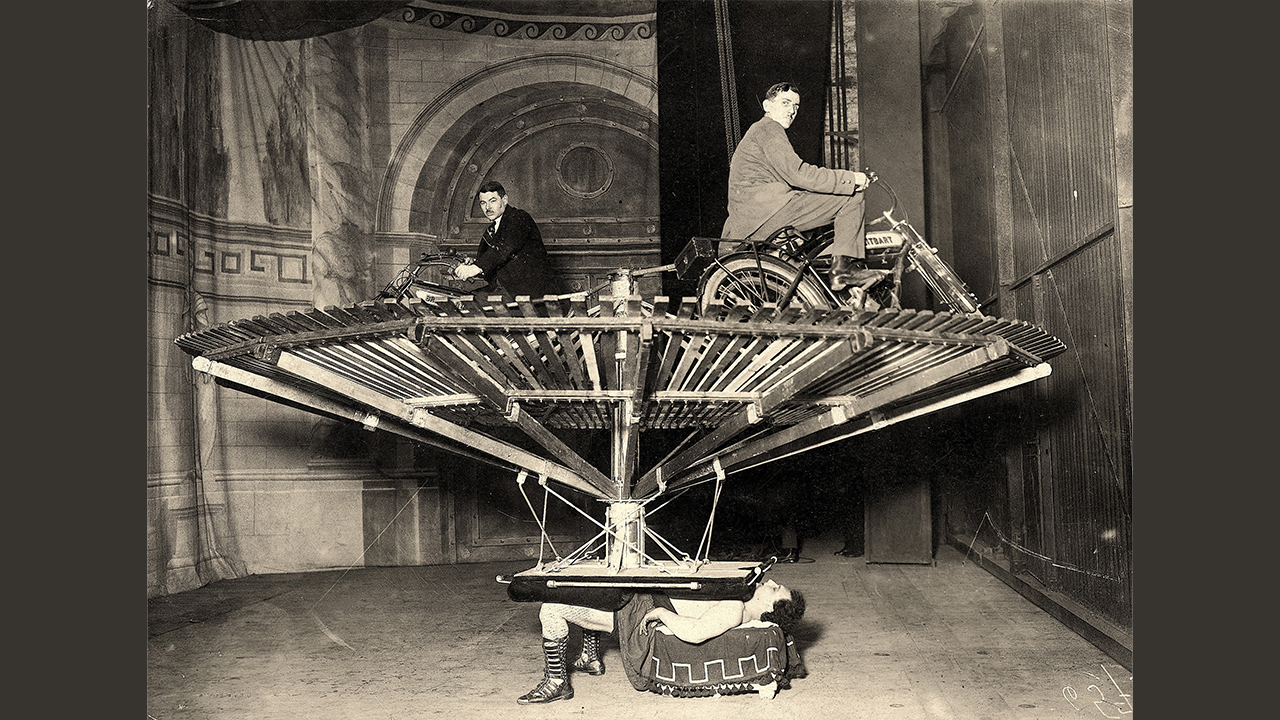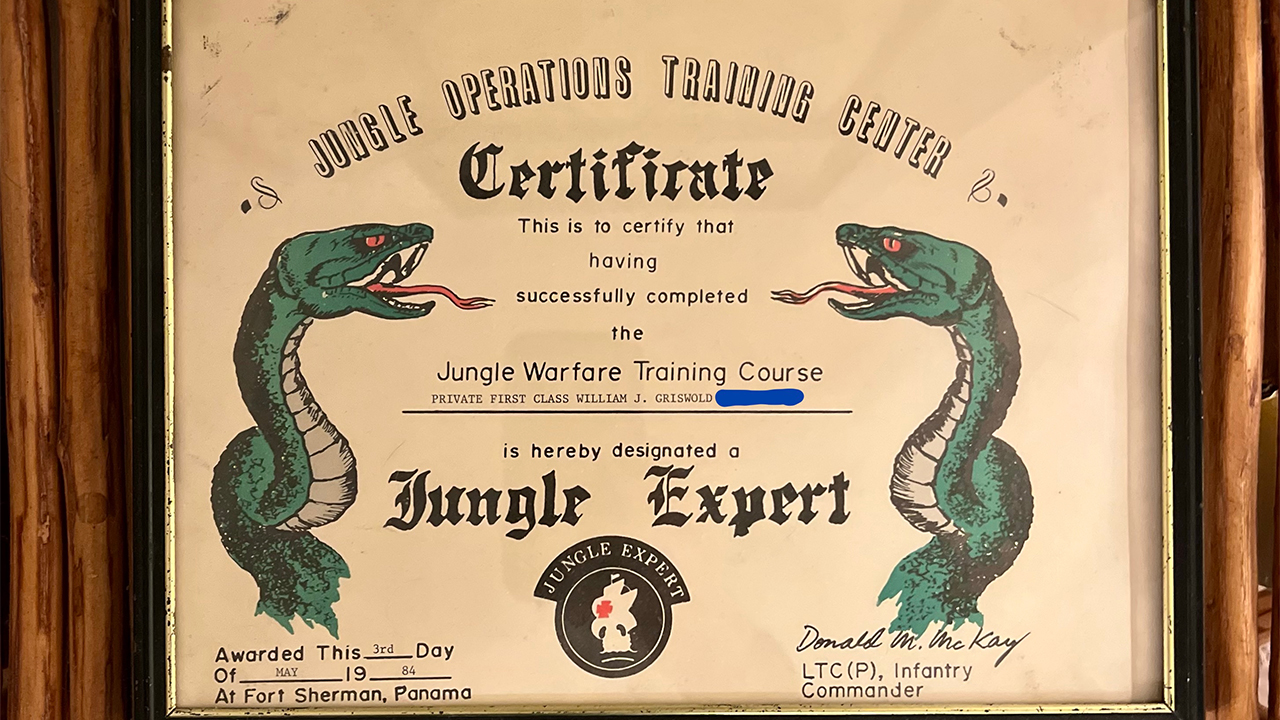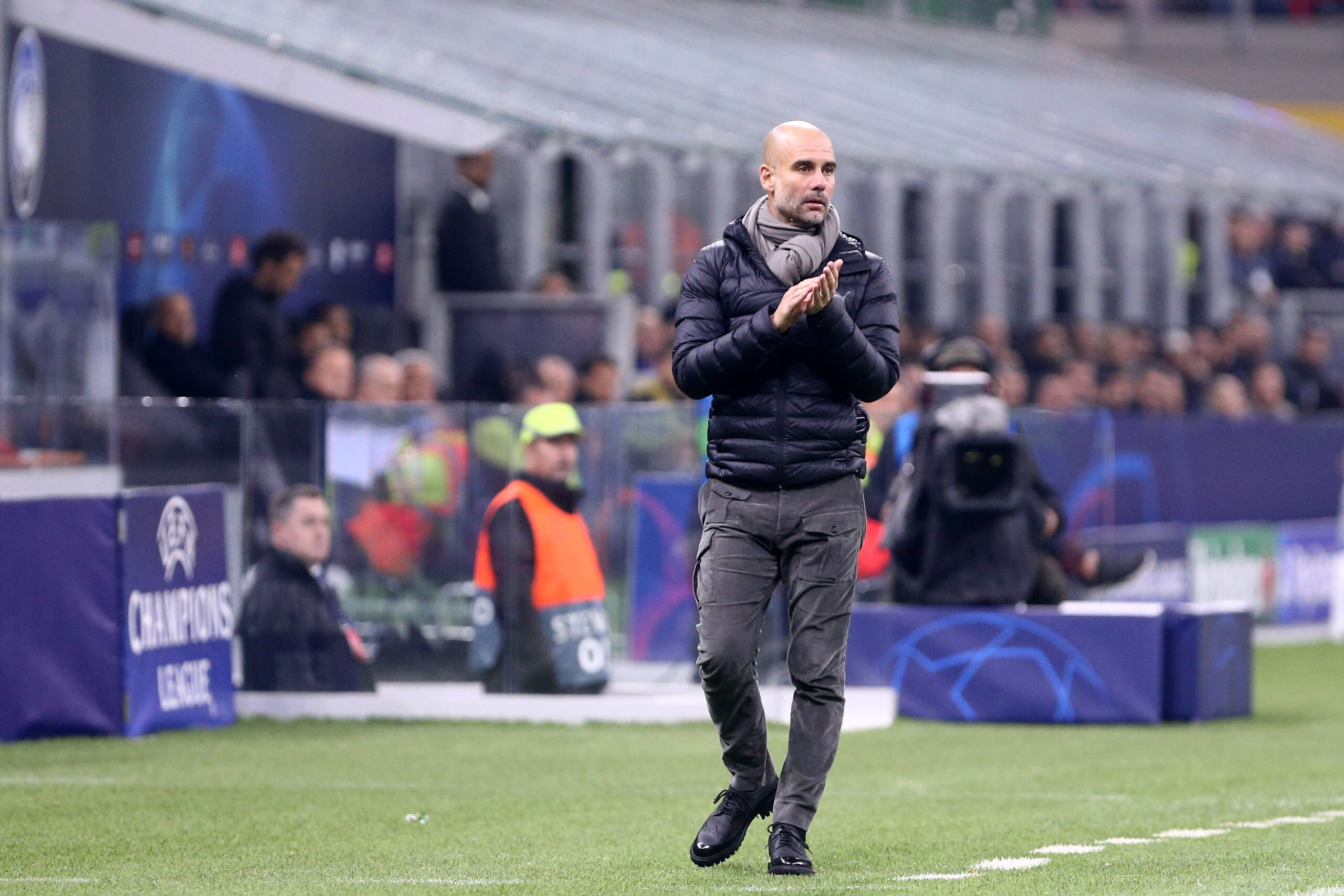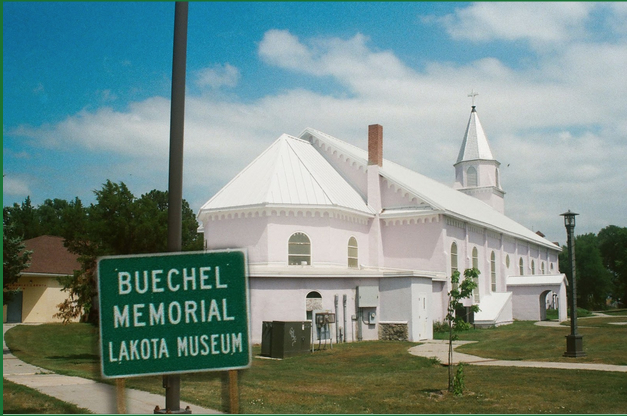Exercising the Prayer Muscle
How praying is the barrier of fitness between meaning and meaninglessness
January 30, 2025
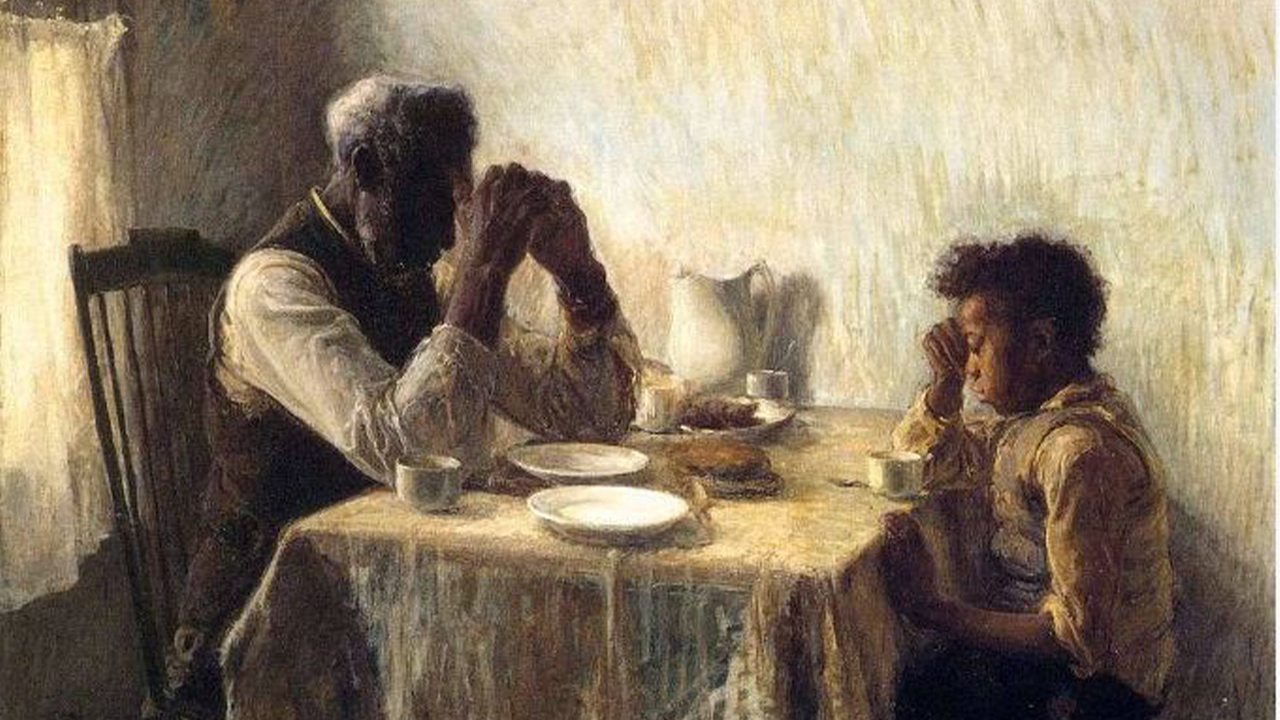
“‘I prayed for you,’ Fran said, in the kind of matter-of-fact way that Simon felt he had never mastered himself…. Did Fran believe in God?…. ‘Not one bit, but that didn’t stop me praying.’”
—from Death at the Sign of the Rook, by Kate Atkinson
I used to love to pray. Making myself small, I felt a calm expanse, a largeness, surrounding me. Kneeling was a letting go, giving in to gravity so there was no longer any distance to fall. I echoed the novenas my grandmother made, trusting their magic numbers and incantations. The saints were lined up waiting to ease our particular hardships—St. Francis called in for our puppy’s bout with distemper; St. Anthony for all the stuff I lost; St. Jude for the impossible. Nothing was impossible with God. And God was always there, just waiting to be asked, implored, begged, bargained with, praised, adored, or thanked.
Now a friend receives a terrifying diagnosis and says, “Pray for me,” and I freeze. Saying, “You’ll be in my thoughts” feels lame. Saying, “I don’t believe in petitionary prayer” feels cold and rude; my ideological struggle is not the point here. If I can do something practical—bring a casserole, drive a friend to the hospital, watch the kids—I focus on that. But often there is nothing to do but pray.
I do try. The words come—old words, learned in childhood—and then stammer to a halt, because it feels dishonest to repeat these easy words when I am so far from the place where I learned them.
William James said that without prayer, there can be no religion. But if you have moved away from organized religion, can there still be prayer?
Absolutely not, the hardliners say. By definition, prayer communicates with a supernatural deity, a powerful personage quite separate from us. Others shrug and say prayer is no different from meditation or mindfulness. Yet it feels different. I have sat (as close to cross-legged as my stiff, clumsy limbs can reach) in Zen meditation. I have trained myself to stay in the moment. With practice, I can imagine all three states blending into one. But for me, as yet unenlightened, praying is more about connecting than emptying. At the times I want to pray, my heart is full, not still.
If I can do something practical—bring a casserole, drive a friend to the hospital, watch the kids—I focus on that. But often there is nothing to do but pray.
Even without prayer, I feel more connected to the world every year—to strangers, trees, rabbits, all of it. I am more comfortable in stillness and silence, more eager for wisdom. I am ripe for prayer—if only I could figure out how, and to whom, I can pray.
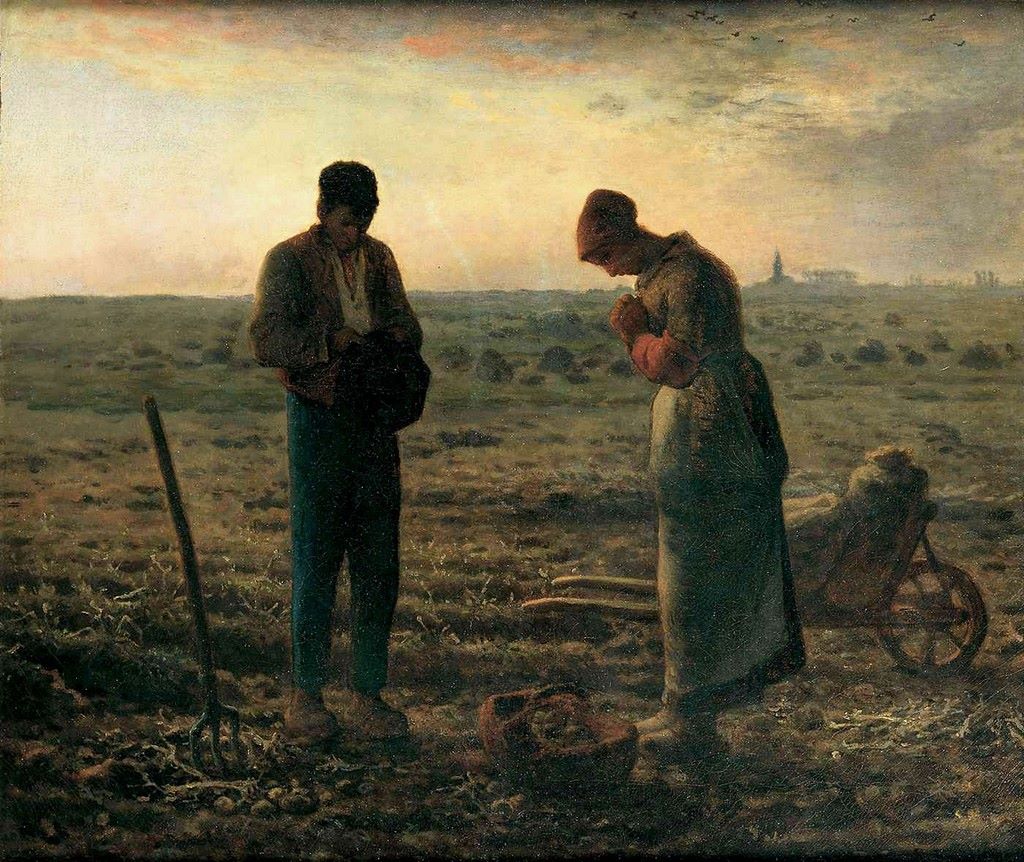
“It sounds as if when we give up chocolate, Buddha will benefit a great deal.”
—Thich Nhat Hanh
Imagine a scroll (impossibly long, unfurling without end) of everything humans have begged God to give them.
General George Patton once ordered his chaplain to pray for the rain to stop. Survivalist Bear Grylls fell to his knees in the middle of Tucker Carlson’s show and prayed that God would vanquish the “demonic forces of the deep state.” In a New Yorker cartoon, a football player stands up in middle of a huddle, hand shielding this eyes as he squints across the field. “Oh, no—” he blurts. “The other team is praying, too.”
It is easy to mock the childishness of such imploring. Even praying for someone we love to stay alive can be selfish, though, driven by the fear that we cannot live without them. Fear, and hope, and jubilation, almost any extreme emotion, brings us to our knees, always has. When wind tore across the land or rain turned it to muck or drought shriveled the berries and starved the game, we petitioned whatever power we could imagine existing.
C.S. Lewis tackled dreams of efficacy years ago, remarking, “The very question ‘Does prayer work?’ puts us in the wrong frame of mind from the outset.” He scoffed at the verb: “‘Work’: as if it were magic, or a machine—something that functions automatically.”
So is presenting our needs and wants to a higher power just magical thinking—or a realistic humility?
More than half the people in this action-oriented country say they pray daily, a far higher percentage than in any other wealthy country surveyed. Words addressed to God, U.S. Americans believe, will bring about a result. But should a result be the point?
A friend once informed me that he wanted to pray for me even though he did not believe it would “work.” C.S. Lewis tackled dreams of efficacy years ago, remarking, “The very question ‘Does prayer work?’ puts us in the wrong frame of mind from the outset.” He scoffed at the verb: “‘Work’: as if it were magic, or a machine—something that functions automatically.” Prayer is request, and “the essence of request, as distinct from compulsion, is that it may or may not be granted…. Invariable ‘success’ in prayer would not prove the Christian doctrine at all. It would prove something much more like magic—a power in certain human beings to control, or compel, the course of nature.”
“When prayer becomes dominating and manipulative in its intent,” Britannica warns, “it becomes magic.” The words are merely “oral talismans,” recited not to communicate but to bring about an effect. Oxford philosopher W.J. Mander sums up the dilemma: “If God refuses every request which does not conform with what He willed to do anyway, then prayer has no real efficacy, but if it is so efficacious that God cannot refuse our requests, then it is not prayer at all but incantation.” The words must be said just so, and the consequence—a marriage proposal, a pregnancy, a rescue—must dazzle us into gratitude.
Philosopher Eleonore Stump argues, giving modern voice to Thomas Aquinas, that petitionary prayer is both desirable and devout. God sometimes waits for us to ask, she suggests, rather than spoil or overwhelm us. But to me, that feels a tad manipulative, with God dangling favors just above our heads until we jump for them.
John Shelby Spong, a beloved Episcopal bishop, was grief-stricken when his wife was given two years to live. Prayer groups formed all over the diocese, and he was deeply touched. But when his wife wound up living for six and a half years, “the prayer groups started taking credit,” he later told an interviewer. What if he had been a garbage collector, and hardly anyone knew to pray for his wife? Would God say, “Spong’s wife gets six years, this other lady nothing extra”?
“I can’t imagine that,” Spong said, “and if I could imagine that, I would become an atheist.”
“I never pray. I don’t believe prayer does anything. Want to prove me wrong? Last June my right foot was amputated. Pray that it grows back. Go ahead. I won’t hold my breath waiting.”
—from Reddit
What is prayer, anyway? A feeble attempt to reach beyond the known world to whatever either made it or holds it together. Prayer attempts to control—or at least come to peace with—the uncontrollable. It is an aspiration but also an assent: you are believing in something, acknowledging something, hoping for something. You have given shape to what is amorphous and uncertain. Psychologically, prayer is a survival tactic.
Except for those of us who pull back—then cannot figure out where to stand.
My mother used to waive away Novocaine and “offer up” the pain of a root canal. To me, this was pointless masochism. For her, it was a proof of love that brought her closer to God. This was logical, in a faith predicated on the notion of suffering as redemptive love. On the other hand, Jesus did kneel and beg God, “If it be possible, let this cup of suffering pass from me.” I suspect he would have taken the Novocaine.
As none was on offer, he prayed. Studies have shown prayer—or is it the confidence in prayer?—relieving pain, extending life expectancy, speeding healing, lifting depression, easing anxiety. But set those studies aside for the moment, because touting them makes praying instrumental, like flossing and fluoride. I do not care if praying will slow my heartbeat or improve my mood or even lengthen my life. I want to know whether it will deepen or distort my understanding.
The researchers are still asking the wrong questions. They record lower blood pressure and heart rate without even checking for an increase in depth, joy, meaning, or compassion. They look for a cure but never ask if Aunt Sally felt calmer, more loved, and safer as she approached an inevitable death. Nor do they ask if the familial bond with Aunt Sally was strengthened; if her heart opened; if the niece who prayed felt closer to her, more forgiving of her foibles, better able to love her.
Prayer is meant to take us out of ourselves. To turn off our frantic, impotent problem-solving and strengthen us for whatever comes next.
I do not care if praying will slow my heartbeat or improve my mood or even lengthen my life. I want to know whether it will deepen or distort my understanding.
When my Jewish husband underwent a tricky surgery, offers of prayer flew in from other Jews, Buddhists, Catholics, Muslims, and Episcopalians. An evangelical Christian called from prison to pray with him. Eavesdropping on that warm, mismatched phone conversation, my qualms about petitionary prayer dissolved. Has anyone ever turned down a chance to be prayed for? The offer is fervent and abiding; it carries far more feeling, intention, and time commitment than a flashed “I’ll be thinking of you.”
Me, I did not pray. I did the Ben Franklin thing and researched the hell out of the procedure, then counted on the surgeon to have steady hands. But each of those promised prayers tied one more knot in a safety net that would catch us if we fell. Not change what happened, but soften the landing.
The surgery went well, and I nearly crumpled with relief and gratitude. Not to a creator I thought had tossed us a favor while others suffered or died, but because this was a reprieve. From whom, though, or what? The only answer I can muster these days is “the variables at play in a universe that throbs with consciousness but is probably indifferent to our individual fates.” What had unfolded in the surgical suite was a gentler reality than the one I had feared. But it easily could have gone otherwise, with no one and nothing to blame except the flaws built into a ragged, mysterious cosmos that offers no safety net.
I say this, but had Andrew been in crisis? Prayers would have rung out loud from my foxhole. You would have had to gag me and chop off my hands to stop me. The words would have come in a breathless rush and blurred together, not a whit of belief behind them, no confidence in a personal God just waiting to intervene. Instead, they would have been an expression of utter helplessness and hope.
Hope is not, come to think of it, a bad definition of prayer.
Neuroscientist Andrew Newberg studied brain scans and found that those who prayed or meditated were more focused and less anxious and felt more connected to other people. Neuroscientist Sara Lazar expanded his findings in studies at Harvard and found that half an hour of meditation each day for eight weeks changed brain volume, thickening areas involved in learning, emotional regulation, empathy, and compassion, and shrinking the amygdala, which sparks anxiety, fear, and stress.
Has anyone ever turned down a chance to be prayed for? The offer is fervent and abiding; it carries far more feeling, intention, and time commitment than a flashed “I’ll be thinking of you.”
“I used to believe that prayer changes things,” said Mother Teresa, “but now I know that prayer changes us, and we change things.”
“In sending love outward, we may notice a chance in our own hearts,” writes Thich Nhat Hanh, a Vietnamese Thiền Buddhist monk, in The Energy of Prayer.
“Prayer does not change God,” said Søren Kierkegaard, “but it changes him who prays.”
How could it not change us to touch what is timeless, pure, deep, vast, uncontrollable, and unconditional? Offered without strings or expectations, prayer empties us of ego, fear, anger, resentment, anxiety, selfishness, and pride, and fills us with love, joy, forgiveness, trust, and gratitude. It leaves us feeling less frustrated and less alone. It stops the mind’s busy chatter and lets us confront our fears, speak them, even if we do so in silence.
It holds us together.
• • •
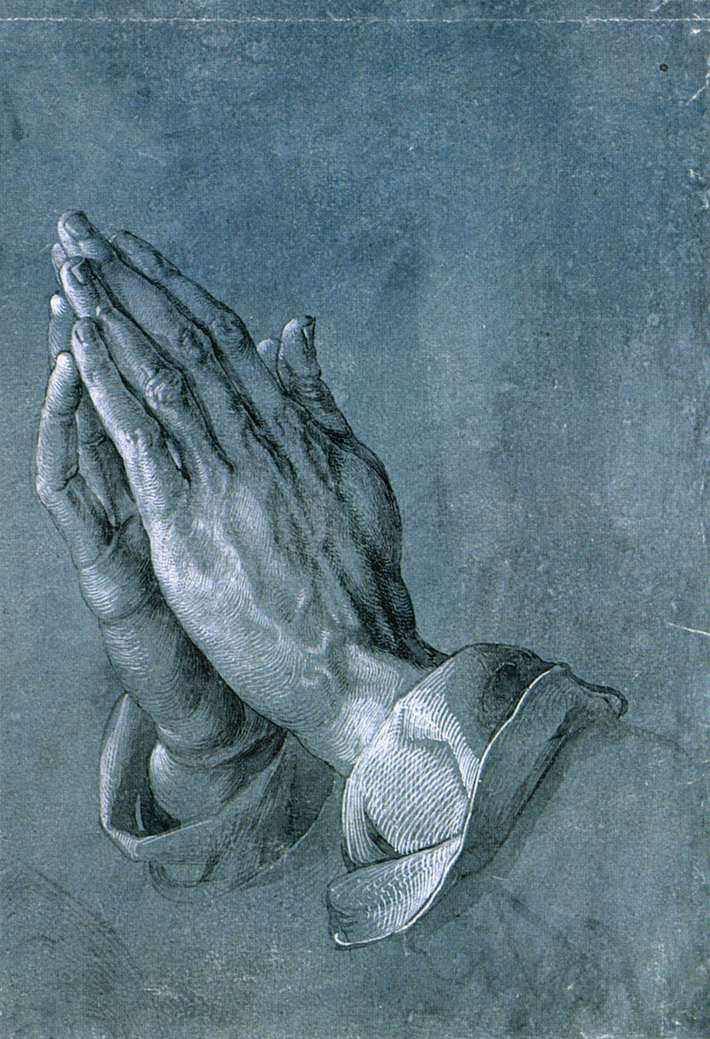
Force me to define the ineffable, and I will say that God is a force of love, meaning, and purpose; an energy that binds everything together. It is easier for me to think of an energy than an old White man with a beard. Plucked out of a personal, human-ish body, God spills into every inch of the world, permeating and transcending all we know.
But in a universe where even a ladybug or an oak tree vibrates with the divine, petitionary prayer is even more complicated. “While the theist finds himself wondering why God has not answered his prayer,” remarks Mander, “the pantheist finds himself wondering why God has not answered His own prayer.”
Waggish, but a fair point. How does one separate from, so that one can pray to, an essence that pervasive?
Watching me flounder, my husband asks a single, practical question: “Do you think God is sentient?”
“Well, yeah,” I say slowly. “As pure consciousness, God would be more sentient than any of us.”
“Then God could hear prayer.”
His words catch me off guard. After all my hand-wringing, they feel too easy. Can that simple logic really put my angst at rest? Can I find a way to say, “I’ll keep you in my prayers” when my prayers are only a fumbling toward something that cannot be personified? How can I talk about the energy of love and not feel silly?
William James felt silly, too. Filling out a questionnaire for a former student, he answered “Do you pray?” by writing, “I can’t possibly pray, I feel foolish and artificial.” Yet in Varieties of Religious Experience, he calls prayer “the very soul and essence of religion,” capable of transforming us. “Energy which but for prayer would be bound is by prayer set free,” he writes. “When we pray, it is like the difference between looking on a person without love, or upon the same person with love.”
I don’t know exactly what a prayer is.
I do know how to pay attention, how to fall down
Into the grass, how to kneel down in the grass, how to be idle and blessed…. Tell me, what else should I have done?
—Mary Oliver
Religio means to connect, to bind. Those of us who mutter that we are spiritual-but-not-religious float free, untethered but also unanchored. Our beliefs are too easily turned into anything we want them to be. Guides to secular prayer ask What does spirituality mean to ME? When do I feel most spiritual? When am I the most content? What activities express MY sense of self? One is alone in the room, talking to oneself.
In Recapture the Rapture, for example, Jamie Wheal suggests nonreligious ways to replace what traditional religion gave us: inspiration, healing, and connection. His paths include breath work, sexual yoga, mind-altering substances, music, cranial-nerve stimulation…. All of which feels a little self-indulgent to me, fine as a means of self-knowledge or self-soothing, but going nowhere except to the self. Prayer can be whatever you want it to be—but it cannot transcend your limits, because it is not directed at anyone or anything but you.
Is my resistance ungenerous? Unimaginative? If a spark of divine energy lives inside all of us, why not go looking for it?
“Prayer does not change God,” said Søren Kierkegaard, “but it changes him who prays.”
For the same reason that I mistrust people who insist that God speaks to them—and just happens to use the exact words they want to hear. Praying to oneself guarantees either a delightful answer or a shamed distortion, but there is no higher power or deeper reality at play, none of what Meister Eckhart called “a pure going out of what is our own.”
I used to love the Easter vigils when we signed up for 2 a.m. and kept watch in the darkened church. I would gaze at the monstrance (such a scary-ugly name for a gorgeous bit of cross and window that pretended to contain God) and feel my heart settle. I loved watching a biker in a leather jacket pull out the pew’s kneeler for an elderly woman in tweed, then kneel alongside her. Even silence is louder, vibrating with energy, when a group of people—all ages and sorts—pray together. And what else can one do during a dark night of the soul, except pray without ceasing?
Andrew listens to me complain about all that I miss, then gives me a wry smile. “You want to save your cake and eat it, too. You want structure, guidance, community, and ritual—without dogma. Is that even possible?”
“I don’t see why it couldn’t be,” I retort, stubborn as ever. He is right, I do want all that, but without anybody trying to pin truth to cork, muddle it with money-grabbing, or anthropomorphize the divinity.
Maybe we are already praying, every time we feel tenderness or gratitude, or reach toward suffering to ease it. The point of prayer is to deepen our awareness of that sacred energy, that divine presence threading through the cosmos. Not to send a telegraph bumping along a wire to some distant deity, return receipt requested.
I test this new hope on Dr. Jordan Grafman, one of the few neuroscientists willing to study prayer. “What if your definition of God is abstract?” I ask. “What if you are getting in touch with a force of energy and not a person?”
“Honestly? It’s cheap,” he replies. “It means I don’t know what the heck I’m praying to.”
Does anyone?
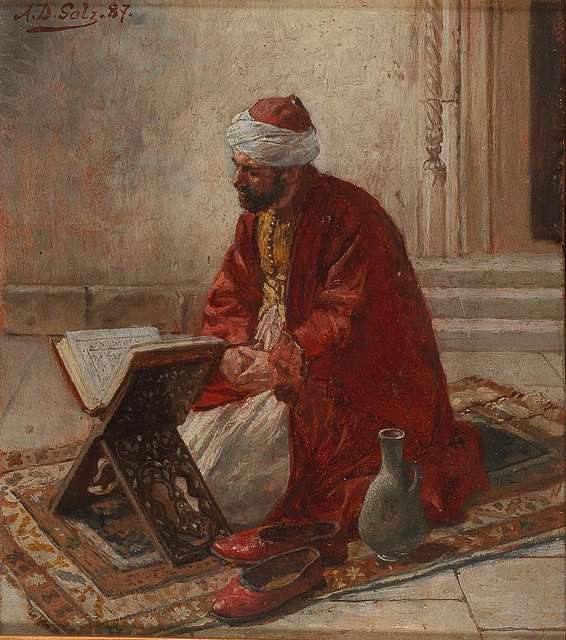
“Love connects us. That’s how God operates…. God is the very relationship that binds us together.”
—Bishop John Shelby Spong
“Do you pray?” A question more intimate than “How much money do you make?” or “How did you lose your virginity?” Yet praying is something we all do, one way or another. Bishop Desmond Tutu said “all of us are meant to be contemplatives.” But dervishes whirl and Shakers tremble and my mother tapped her fingers in impatience at the quiet parts of the Mass. She prayed by loving people hard, everyone she met, and staying in constant motion doing for others.
I pray to her now. Pray, in the sense of communicating with something beyond my physical reality that feels holier than I am. This practice feels saner when I read Thich Nhat Hanh casually noting that he prays to his students. And once you wrap your head around that, he wrote, it is easier to understand that “we can also pray to the pine tree, the moon, and the stars.” If you are deeply in touch with a tree, he reasoned, you are also able to be in touch with “the one mind, with God.” And “if touching God means that God is able to transmit energy to us, then the pine tree can also transmit energy to us.”
If everything in every universe has some degree of consciousness, then prayer as meditation, tapping into that consciousness, makes perfect sense. So does sinking into your own consciousness or tuning into the consciousness you believe exists in nature. This is God as gestalt, present in everything but far greater than the sum of the parts. God not as a supernatural entity, but as the energy “in whom we live and move and have our being” (ACTS 17:28). Can that awareness, steadily deepened, be my prayer?
Will it let me pray for someone?
For secular humanists, the only prayer that makes sense is compassionate action. So I was surprised to read a prayer by Kate Lovelady, former leader of the St. Louis Ethical Society, at an interfaith prayer service for the women of South Dakota, where a total ban on abortion was coming up for a vote. “How shall we pray together, from our different beliefs and traditions?” she asked. “How shall we pray for those living right now under a shadow, for those whose human rights of worth and dignity, of sovereign selfhood, are threatened? We will pray with our ears, listening deeply to women, to their questions, to their relief and their regrets; we will listen to those who would criminalize women’s health decisions, to understand their feelings so that we may try to reach their hearts. We will pray with our eyes, witnessing the ugly messages used to intimidate, witnessing the fear and determination in the eyes of women and health workers….” And on she went, praying with our hands, holding theirs; with our feet, escorting them to safety; “with our whole lives, that the lives of women may remain whole.”
The point of prayer is to deepen our awareness of that sacred energy, that divine presence threading through the cosmos. Not to send a telegraph bumping along a wire to some distant deity, return receipt requested.
Her words were not directed at any divine being, yet to me, they qualify easily as prayer. They ask nothing of a greater power, yet express a profound wish. They urge action, yet by sheer beauty and force, require contemplation first.
Other images of prayer that have stayed with me are reversals. The young doctor I came upon in a chapel one day, kneeling on his prayer rug facing, not the altar, but the east corner. The woman dressed in torn clothes, her face smudged with dirt, who used to twist her body around on one of St. Francis Xavier’s hard pews and pray to the choir loft. Christians say “God is everywhere,” but seldom credit it.
There are many ways to pray.
• • •
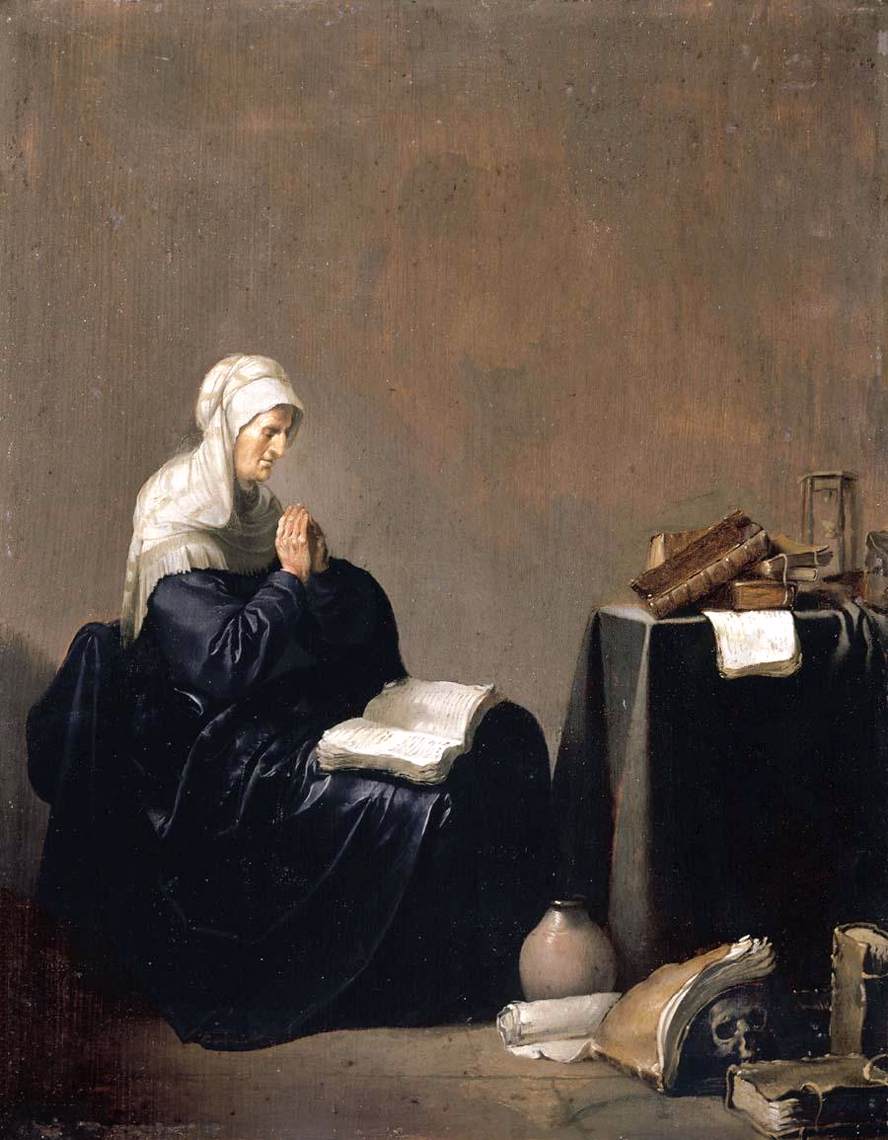
Maybe we just need new language to reflect all that variation. “Praying” is at once overspecific and slippery. It has the connotation of imploring, which takes us back to petition. Yet “I’ll be thinking of you” is perfunctory. “Thoughts and prayers” are a copout. “I’ll meditate for you” feels like a slap in a friend’s face, focused on my own serenity and not their dire need. “I will hold you in my heart” sounds mawkish. Atheist friends have promised to “light a candle,” and I loved the thought of a glow halfway across the country, lit with hope. Buddhists speak of “sending spiritual energy.” “I’ll be loving you” is what I want to say, but we forget that love is a verb, so even the syntax sounds gushy and weird.
If petitionary prayer is simply hope, can I say, “I will be hoping for you”? Or does that sound lame because hope, as a virtue, has lost power? We are used to making things happen, even by divine proxy.
“Do you pray?” A question more intimate than “How much money do you make?” or “How did you lose your virginity?”
When I pray—because I do, sometimes, despite my sense that I cannot—I do not “talk to God,” in the customary, conversational way. There seems no need of words; it is like trading looks with someone you know well. In nature, especially, prayer is just a soft awareness, what Simone Weil called “loving attention.” I watch leaves curl or brown as closely as I listen to my husband’s breath in sleep. I pop a ripe fig in my mouth and feel as grateful as someone accepting a prize.
For a while I rewrote prayers in my head. When an ambulance siren wails, I say under my breath, “Let even this be an occasion for love,” reminding myself that pain and love are inextricable. My thoughts travel a little way with the ambulance, then return to whatever I was doing. I will never know who was on that stretcher or whether they lived or died. I have done nothing for them. But I would rather react to a siren with solidarity than wince at the loud noise.
At a volunteer appreciation dinner, I hear someone intone, “Holy Father” and substitute my own version, replacing the orotund “Let us pray” with: Let us reach toward the love that glues the universe together, that cherishes and protects the vulnerable; that fires our minds and hearts with inspiration.
Decades ago, after months of skipping over recited phrases or falling silent, I left the Catholic church. I was young and rigid in my idealism, precious about my integrity. But I stayed grateful for the color and mystery Catholicism added to my life. Religion taught me that every person has an innate dignity, however desperately poor, hideously ugly, addled or slow, cranky or violent.
Now, my attitude toward petitionary prayer is softening. Such prayers are honest, after all. Simple. Childish but also childlike, humble and unguarded. Confiding what you long for is part of loving someone.
Maybe I can promise my friend “You’ll be in my prayers” without meaning that I will beg for a particular result? Maybe it is enough to acknowledge someone’s pain—and my hope to ease it—in a conversation with the universe.
“Praying” is at once overspecific and slippery. It has the connotation of imploring, which takes us back to petition.
Instead of directing my prayers toward a benevolent father figure, I let them float outward, like a wish corked into a bottle with hope its only chance. My intellectual dance is over, that prim refusal to pray because I do not believe in petitionary prayer. I still do not believe in petitionary prayer. But I believe that holding other people’s suffering in your heart and wishing it away creates compassion. Asking people to pray for you ties you to them. Being asked to pray for someone is an honor, not an ideological test.
We all hold each other up. I still make a rushed sign of the cross on my forehead whenever I hear a siren, not because I think it will put out a fire or stop a stroke, but because it reminds me that we are all in this together, all part of a single body.
“Sit down. Be humble,” raps Kendrick Lamar. It might be that simple.
Read more by Jeannette Cooperman here.
